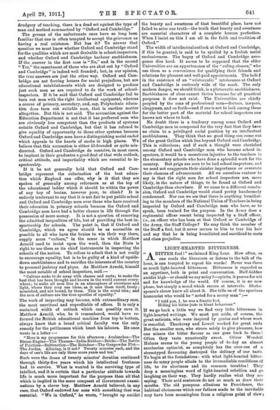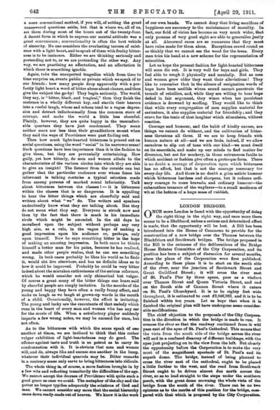LIGHT-HEARTED BITTERNESS.
ABITTER fool !" exclaimed King Lear. How often, as one reads the literature or listens to the talk of Olt hour, is one tempted to repeat his words! Never was there so much light-hearted bitterness. Bitterness is regarded as an appetiser, both in print and conversation. Half-hidden amidst high—or should we say noisy ?—spirits, it passes for wit and for knowledge of the world. Of course, it is no new phase, but simply a mood which recurs at intervals. Shake- speare's shrew knew all about it. She tells us of the spurious humourist who would be " noted for a merry man "I told you, I, he was a frantic fool,
Hiding his bitter jests in blunt behaviour."
If we go back a little way we find very little bitterness in light-hearted writings. We must put aside, of course, the great satirists, who were inspired by genius and whose work is remediaL Thackeray and Lowell worked for great ends But the smaller men, who strove solely to give pleasure, how one misses the bitter flavour as one goes back to them ! Often they taste unnaturally sweet. Oliver Wendell Holmes seems to the young people of to-day an almost saccharine optimist, so completely has the over-use of a stereotyped flavouring destroyed the delicacy of our taste. To begin at the foundations : with what light-hearted bitter- ness do many people allude to the irremediable conditions of life, to its shortness and its common troubles ! They drop a meaningless word of light-hearted rebellion and go laughing on their way. They hardly realise what they are saying. Their acid sentences do not so much as draw their mouths. The old pompous allusions to Providence, the habitual obeisances which our fathers made to the inevitable may have been meaningless from a religious point of view;
a mere conventional method, if you will, of setting the great unanswered questions aside; but that is where we, all of us, set them during most of the hours out of the twenty-four.
A decent form in which to express our mental attitude was a great convenience ; conventionality is often the best vehicle of sincerity. No one considers the everlasting terrors of exist- ence with a light heart, and to speak of them with frothy bitter- ness is to be insincere. Either we are thinking seriously and pretending not to, or we are pretending the other way. Any way, we are practising an affectation, and an affectation in which there is something ignoble.
Again, take the unexpected tragedies which from time to time surprise us, events public or private which we speak of to our friends : how many people drop apparently with a per-
fectly light heart a word of bitter abuse about chance, and then give the subject the go-by! They begin seriously. The world, they say, is " bitter, black, and tragical," then they finish the sentence in a wholly different key, and startle their hearers into a rueful laugh, whose sad echoes tend to a vague depres- sion and detract infinitesimally from the common store of courage, and make the world a little less cheerful. Plainly, however, they are quite happy in the uncomfort- able quarters they have just condemned. They mean neither more nor less than their grandfathers meant when they said the ways of Providence were past finding out.
Then how much light-hearted bitterness is poured out on social questions, using the word " social" in its narrower sense! Such questions have less importance than it is the fashion to give them, but they are perennially entertaining. How gaily, yet how bitterly, do men and women allude to the characteristics of the various circles into which they are able to give an insight! The listener from the outside can but gather that the particular enclosure over whose fence his informant is talking contains a typical selection made from among persons of marked moral inferiority. Talk about bitterness between the classes ! — it is bitterness within the classes that is so dangerous. It is appalling to hear the bitter things which are cheerfully said and written about what " we" do. The writers and speakers undoubtedly know what they are talking about. But they do not mean what they say. Everyone is struck now and then by the fact that there is much in his immediate circle which might be amended. In the old days he moralised upon the subject without perhaps any very high aim, as a rule, in the vague hope of making a good impression upon his audience or, perhaps, only upon himself. Now he says something bitter in the hope of making an amusing impression. In both cases he thinks himself a better man for his pains, because he has realised, and made other people realise, that he can see something wrong. In both cases probably he likes his world as he finds it, would nbt live elsewhere, and has no definite ideas as to how it could be improved. Probably he could be very bitter indeed about the mistaken enthusiasms of the serious reformer, which he would consider not only chimerical but vulgar. Of course a great many of the bitter things one hears said by cheerful people are simply imitative. In the mouths of the young and happy they have often a really funny effect, and make us laugh as we laugh at grown-up words in the mouth of a child. Occasionally, however, the effect is irritating. The young and lucky are the executants of that melody which runs in the heart of every man. and woman who has any ear for the music of life. When a satisfactory player suddenly imparts a few wrong notes, we may be amused for once, but not often.
As to the bitterness with which the sexes speak of one another at times, we are inclined to think that this rather vulgar exhibition of light-heartedness may do good. The offence against taste and truth is so patent as to carry its condemnation with it. It is obvious that men and women will, and do, always like and excuse one another in the lump, whatever their individual quarrels may be. Bitter remarks in a contrary sense only serve to bring bitterness into ridicule.
The whole thing is, of course, a mere fashion brought in by a few wits and reflecting transitorily the difficulties of the age. We cannot accept the decrees of Providence with quite such a good grace as once we could. The metaphor of the clay and the potter no longer typifies adequately the relations of God and man. We cannot consider any more that the social hierarchy came down ready-made out of heaven. We know it is the work of our own hands. We cannot deny that living sacrifices of happiness are necessary to the maintenance of morality. In fact, our field of vision has become so very much wider, that only persons of very good sight are able to generalise justly at all. Abnormal cases are so numerous that they must have rules made for them alone. Exceptions crowd round us so thickly that we cannot see the wood for the trees. Every man tries his hand at a new scheme for the representation of minorities.
Let us hope the present fashion for light-hearted bitterness will soon die out. It is very well for boys and girls. They feel able to rough it physically and mentally. But as men and women grow older they want their alleviations ! They like to remember that in the silence of resignation words of hope have been audible whose sound cannot penetrate the tumult of rebellion, and, while they are willing to hear hope defied in fair argument, they wince when her persistent evidence is drowned by scoffing. They would like to think that while every congregation of men supplies material for caricature, it also supplies material for friendship ; and they crave for the tonic of that laughter which stimulates, without reaction.
Courage and humour, and the habit of kindly excuse, are things we cannot do without, and the cultivation of bitter- ness threatens all three. If we are to keep friends with human nature at all—and we are fools, indeed, if we allow ourselves to slip out of tone with our kind—we must dwell on its essentials, and make up our minds to find matter for diversion, but not for mockery, in those extraneous faults to which accident or fashion give often a grotesque form. There is no doubt a courage of desperation upon which bitterness has no effect, but that is not the courage necessary for every-day life. And there is no doubt a grim satiric humour which bitterness hardens and sharpens, but it reduces ordi- nary courage to mere bravado, and ordinary humour—the exhaustless treasure of the wayfarer—to a small modicum of wit at the bottom of a. huge mass of rubbish.



























































 Previous page
Previous page